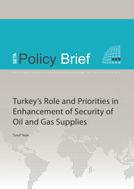Turkey is enthusiastic to playing a driving and constructive role in transportation of the Caspian, Middle Eastern and Central Asian hydrocarbon resources to Europe and World Markets.
Turkey’s Role and Priorities in Enhancement of Security of Oil and Gas Supplies
Diversification of imports in terms of sources, routes and technologies has been an important policy tool in order to improve energy security in general. Turkey has already achieved diversification to some extent in its gas supplies, evidenced by the number of pipelines and LNG options.
Geographically located in close proximity to hydrocarbon-rich regions, Turkey forms a natural energy corridor between important source countries and big consumer markets, and stands as a key country in ensuring global energy security through diversification of supply sources and routes.
Within this context, some major pipeline projects have already been realized and some others have been projected. These projects aim to contribute to regional and global energy security while strengthening Turkey’s role more as an energy player. It is widely acknowledged that Turkey offers most viable routes for safe and uninterrupted flow of hydrocarbon sources to the world markets.
Strengthening the electricity transmission grid in parallel to the expansion of the generation infrastructure is also an integral part of the Turkish electricity security policy.
Turkey is enthusiastic to playing a driving and constructive role in transportation of the Caspian, Middle Eastern and Central Asian hydrocarbon resources to Europe and World Markets. For this purpose, Turkey displays its readiness for development of new projects which would both contribute to enhancing energy security of its regions and partner countries, and to improving prosperity and peace in a broader region.
***
Given the growing demand, limited nature of primary energy resources, geographical differences, technological trends and economic impacts, energy security has been an important strategic aspect of a secure, sustainable and competitive energy policy. Long-term energy security is largely linked to timely investments along the supply and demand chain to foster economic and social development. Short-term energy security, on the other hand, is perceived as the ability of an energy system to react promptly to sudden changes in supply and demand. Therefore, energy security has strong ties to energy supply sources, routes, technologies and the investments required in order to mobilize all these.
As far as energy security is concerned from a holistic perspective, integration of the electrical infrastructure and markets among the countries in a certain region becomes equally significant. Harnessing of natural gas in electricity generation cannot be considered independent of energy security issue in general, and natural gas supply security in particular. Therefore, it is also important to highlight that policies of renewable energy and energy efficiency should be associated with the energy security policies...










